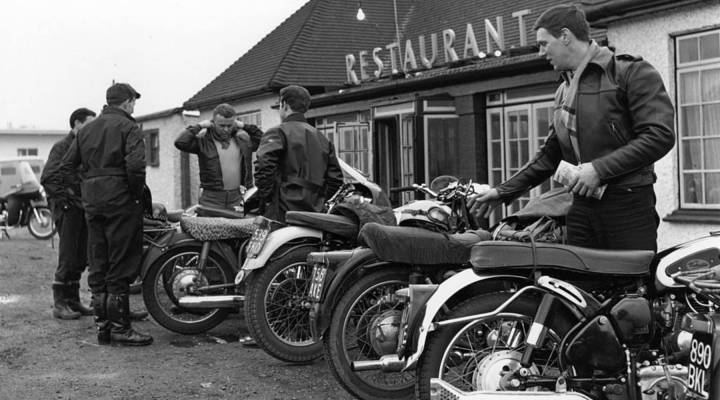
What’s the trick to getting young people to ride motorcycles?
What’s the trick to getting young people to ride motorcycles?

At Bartels’ Harley-Davidson in the Southern California beach town of Marina Del Rey, customers stroll around looking at cruisers — those motorcycles you ride with your feet out in front and hands up high. There are plenty of tattoos and leather jackets on this middle-aged set. But there aren’t many young people around.
General manager Ron Bartels said selling Harleys was a lot easier 10 years ago. After the financial crisis, discretionary income became less abundant, so sales dipped.
“There’s definitely less people buying motorcycles,” he said. “Our future goal is to get more butts on seats.”
In 2016, U.S. customers rolled off with 371,403 new bikes, roughly half as many as a decade ago, according to the Motorcycle Industry Council.
At Harley, the latest quarterly earnings show U.S. sales were down more than 4 percent compared to the same period last year. Numbers were down almost 10 percent in Asia.
Like other manufacturers, Harley’s got an age problem.
“A lot of the brands like Harley-Davidson are iconic, and you have to pay a premium for that,” said Gleb Mytko, an analyst with business research company The Freedonia Group. “For a lot of the younger riders, their stagnant wages and issues with student debt have made it harder to afford a motorcycle that often came with costs of more than $25,000.”
To attract younger riders, bike makers have been offering slimmer, more streamlined models, which are cheaper. Young people tend to go for the hipper look, a Triumph or even the new Honda Rebel.
That’s one reason Harley introduced the Street series of bikes. They don’t look like traditional Harleys. They’re shorter and put riders lower to the ground. And on this one, riders sit leaning forward, not with a straight back like on a traditional cruiser. These bikes also don’t sound much like Harleys. Absent is what riders call the “potato potato” coming out of the exhaust.
| Electric cars have arrived. But what about electric motorcycles? |
| Motorcycle companies are finally catching up to their female clientele |
| Two obsessed guys and a radical motorcycle design |
The sound of the Street 750 isn’t going to turn any heads as you ride by. It’s a comfortable ride, though, and fits nicely with what younger people are buying: bikes more suitable for commuting that cost less than $7,000 (that is, if they’re buying a motorcycle at all).
Harley also offers classes for first-time riders, using the Street series to teach. John Sosebee, the man in charge of the training class at Bartels’, said he thinks riders are receptive to learning on these new Harleys.
“It’s a little heavier than some of the training bikes you’ll see on other training sites,” he said. “But it carries that weight very low, and it’s actually easy to manage, and it gives them a more realistic feeling of what they may encounter when they do get that full-size Harley.”
That’s the goal: Get someone on a smaller bike and eventually sell them on a souped-up, $25,000 cruiser.
Brian Islas, a 24-year-old who rode a motorcycle for the first time in class, said not many of his contemporaries go for Harleys.
“My younger friends actually have sports bikes, and I’m leaning more towards Harley for the heritage and the old-school vibe of it,” Islas said.
But he’s also realistic about how much he can spend on his first bike. He said if he sticks with the brand, he’s looking at getting a used Harley.
The company said it wants to attract 2 million new U.S. riders over the next 10 years. To do that, Harley is aiming to introduce 100 new motorcycle models, including an electric bike.
Mytko at The Freedonia Group thinks electric is the future of motorcycles.
“A lot of companies are investing heavily in research and development, and many of these are being widely used in Asia,” he said. “So, I foresee their use increasing in the U.S. over time as well.”
An electric Harley is something a little hard to imagine. But if you can’t get young people to hop on a decked-out cruiser for a weekend ride, maybe you can sell them on the idea of how great that selfie’s going to look when they’re revving up that electric motorbike.
There’s a lot happening in the world. Through it all, Marketplace is here for you.
You rely on Marketplace to break down the world’s events and tell you how it affects you in a fact-based, approachable way. We rely on your financial support to keep making that possible.
Your donation today powers the independent journalism that you rely on. For just $5/month, you can help sustain Marketplace so we can keep reporting on the things that matter to you.

















